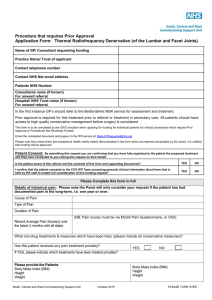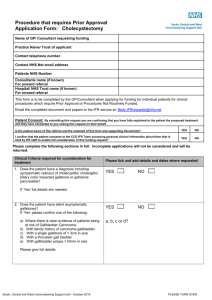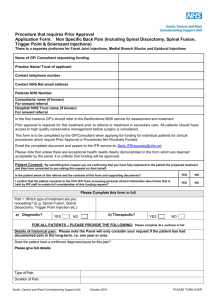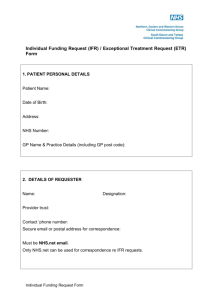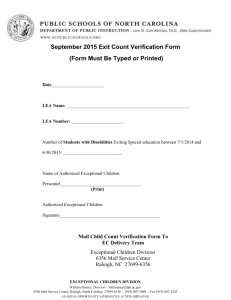Divarication of the Recti Muscle Form
advertisement
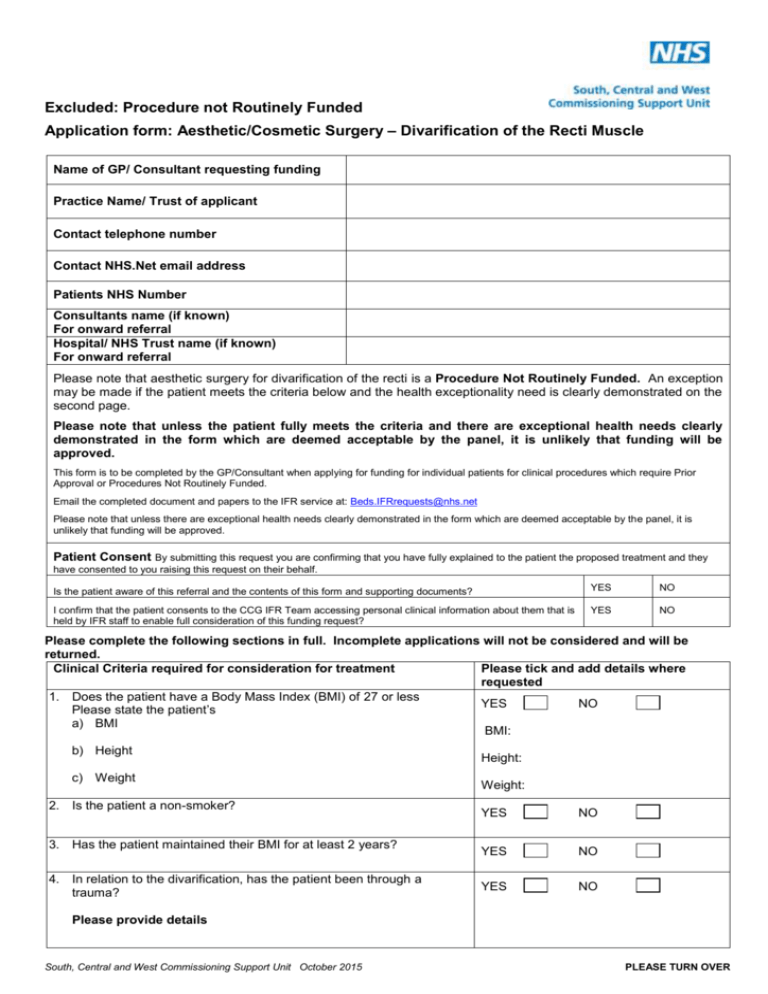
Excluded: Procedure not Routinely Funded Application form: Aesthetic/Cosmetic Surgery – Divarification of the Recti Muscle Name of GP/ Consultant requesting funding Practice Name/ Trust of applicant Contact telephone number Contact NHS.Net email address Patients NHS Number Consultants name (if known) For onward referral Hospital/ NHS Trust name (if known) For onward referral Please note that aesthetic surgery for divarification of the recti is a Procedure Not Routinely Funded. An exception may be made if the patient meets the criteria below and the health exceptionality need is clearly demonstrated on the second page. Please note that unless the patient fully meets the criteria and there are exceptional health needs clearly demonstrated in the form which are deemed acceptable by the panel, it is unlikely that funding will be approved. This form is to be completed by the GP/Consultant when applying for funding for individual patients for clinical procedures which require Prior Approval or Procedures Not Routinely Funded. Email the completed document and papers to the IFR service at: Beds.IFRrequests@nhs.net Please note that unless there are exceptional health needs clearly demonstrated in the form which are deemed acceptable by the panel, it is unlikely that funding will be approved. Patient Consent By submitting this request you are confirming that you have fully explained to the patient the proposed treatment and they have consented to you raising this request on their behalf. Is the patient aware of this referral and the contents of this form and supporting documents? YES NO I confirm that the patient consents to the CCG IFR Team accessing personal clinical information about them that is held by IFR staff to enable full consideration of this funding request? YES NO Please complete the following sections in full. Incomplete applications will not be considered and will be returned. Clinical Criteria required for consideration for treatment Please tick and add details where requested 1. Does the patient have a Body Mass Index (BMI) of 27 or less YES NO Please state the patient’s a) BMI BMI: b) Height c) Weight 2. Is the patient a non-smoker? 3. Has the patient maintained their BMI for at least 2 years? 4. In relation to the divarification, has the patient been through a trauma? Height: Weight: YES NO YES NO YES NO Please provide details South, Central and West Commissioning Support Unit October 2015 PLEASE TURN OVER 5. In relation to the divarification, was this caused by pregnancy? YES NO YES NO YES NO YES NO YES NO YES NO YES NO Please provide details 6. In relation to the divarification, is this a congenital abnormality? Please provide details 7. Is there a reason to believe that corrective surgery will lead to an improvement in health status for this patient? (Please see footnote). Please provide details 8. Does the patient have significant functional impairment and is disabled by the condition? Please provide details 9. What conservative management has the patient tried? Please provide details 10. Please provide photographs to support this patient’s case. Cases will not be considered without photographs 11. Is there compelling evidence of psychological distress, social distress, or adverse physical health effects on this patient? (Please see footnote) List of medicines tried is required. Please provide details 12. Please provide details of any treatment already received for the same condition 13. Why do you think this patient should be an exception to current policy or considered to have an exceptional health need for the intervention requested? (please see foot not for definition) SIGNATURE OF CLINICIAN ……………………………………………………………. DATE: ………………………………………………….. Exceptional Status (what makes the individual sufficiently different from the ‘usual’ in policy terms) Central to consideration of individual requests for funding is the concept of the case being exceptional. In order for funding to be agreed there must be unusual or unique clinical factors about the patient that suggest that they are: Significantly different to the general population of patients with the condition in question and likely to gain significantly more benefit from the intervention than might be expected from the average patient with the condition. However: The fact that a treatment is likely to be efficacious for a patient is not, in itself, a basis for an exception. If a patient's clinical condition matches the 'accepted indications' for a treatment that is not funded, their circumstances are not, by definition, exceptional. Social value judgements (the 'worth’ of patients) are not relevant to the consideration of exceptional status but there may rarely be exceptional circumstances where benefits may go beyond the patient (e.g. as a carer) in respect of social or health related benefits for others. Please email the completed form to Beds.IFRrequests@nhs.net for consideration. South, Central and West Commissioning Support Unit October 2015


